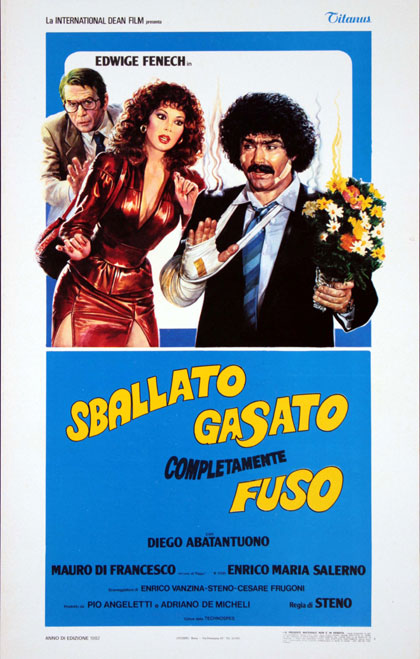A sarcastic and light-hearted comedy set in the world of journalism that tackles class and workplace issues
Edwige Fenech doesn’t get to have a shower but finally lands herself a well-rounded role
Diego Abatantuono explodes like a cyclone with his insane jargon
Steno explores the world of journalism in his umpteenth film dealing with conflicts of class and the workplace, in this mildly sarcastic comedy. In this film, the newspaper in question leans to the left of the political sphere (those familiar with Italian journalism, may recognise Eugenio Scalfari and Oriana Fallaci behind the half-heartedly changed names) and proclaims to always report nothing but the truth and be ready to bring down governments if necessary. In reality, it is more inclined towards chauvinism and titillating scandals. In this context, Edwige Fenech finally manages to carve out a well-rounded role for herself: the star par excellence of Italian voyeur-comedies, here seems to be winking at herself when she declares to be sick and tired of being considered only for her body and not her brains. Diego Abatantuono, who drives her around in a taxi, enters like a cyclone into the story at regular intervals, reaching great comedic heights with his habitually insane jargon. In essence, there is no point in arguing when faced by such evidence, as the title suggests the modern male is: unstable, over-excitable and completely crazy.
Patrizia has ambitions to become a great reporter, but the newspaper she works for relegates her to writing dull columns. She makes a bet with the editor: if she doesn’t manage to come up with a front-page story within one week, she will sleep with him. Fate appears to be constantly against her, and a ride in a taxi driven by a bizarre character turns out to be a waste of time. In the end, however, she will manage to come up with the goods. As far as the bet is concerned, it doesn’t matter in any case: she and the editor realise they are in love with one another.
A sarcastic and light-hearted comedy set in the world of journalism that tackles class and workplace issues
Edwige Fenech doesn’t get to have a shower but finally lands herself a well-rounded role
Diego Abatantuono explodes like a cyclone with his insane jargon
Steno explores the world of journalism in his umpteenth film dealing with conflicts of class and the workplace, in this mildly sarcastic comedy. In this film, the newspaper in question leans to the left of the political sphere (those familiar with Italian journalism, may recognise Eugenio Scalfari and Oriana Fallaci behind the half-heartedly changed names) and proclaims to always report nothing but the truth and be ready to bring down governments if necessary. In reality, it is more inclined towards chauvinism and titillating scandals. In this context, Edwige Fenech finally manages to carve out a well-rounded role for herself: the star par excellence of Italian voyeur-comedies, here seems to be winking at herself when she declares to be sick and tired of being considered only for her body and not her brains. Diego Abatantuono, who drives her around in a taxi, enters like a cyclone into the story at regular intervals, reaching great comedic heights with his habitually insane jargon. In essence, there is no point in arguing when faced by such evidence, as the title suggests the modern male is: unstable, over-excitable and completely crazy.
Patrizia has ambitions to become a great reporter, but the newspaper she works for relegates her to writing dull columns. She makes a bet with the editor: if she doesn’t manage to come up with a front-page story within one week, she will sleep with him. Fate appears to be constantly against her, and a ride in a taxi driven by a bizarre character turns out to be a waste of time. In the end, however, she will manage to come up with the goods. As far as the bet is concerned, it doesn’t matter in any case: she and the editor realise they are in love with one another.

